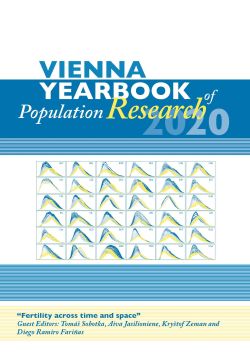
| ISSN | 1728-4414 |
| ISSN Online | 1728-5305 |
| ISBN-13 | 978-3-7001-8702-8 |
| ISBN-13 Online | 978-3-7001-8773-8 |
| Subject Area | Sociology and Economics |
| Quality review | refereed - online |
| doi | 10.1553/populationyearbook2020 |
Introduction

page 1
doi: 10.1553/populationyearbook2020.int01
Debate

page 27
doi: 10.1553/populationyearbook2020.deb01

page 33
doi: 10.1553/populationyearbook2020.deb02

page 39
doi: 10.1553/populationyearbook2020.deb03

page 43
doi: 10.1553/populationyearbook2020.deb04

page 63
doi: 10.1553/populationyearbook2020.deb06

page 71
doi: 10.1553/populationyearbook2020.deb07
Review Article

page 83
doi: 10.1553/populationyearbook2020.rev01
Research Articles

page 123
doi: 10.1553/populationyearbook2020.res01

page 141
doi: 10.1553/populationyearbook2020.res02

page 167
doi: 10.1553/populationyearbook2020.res03

page 185
doi: 10.1553/populationyearbook2020.res04

page 215
doi: 10.1553/populationyearbook2020.res05

page 237
doi: 10.1553/populationyearbook2020.res06
Data and Trends

page 267
doi: 10.1553/populationyearbook2020.dat01